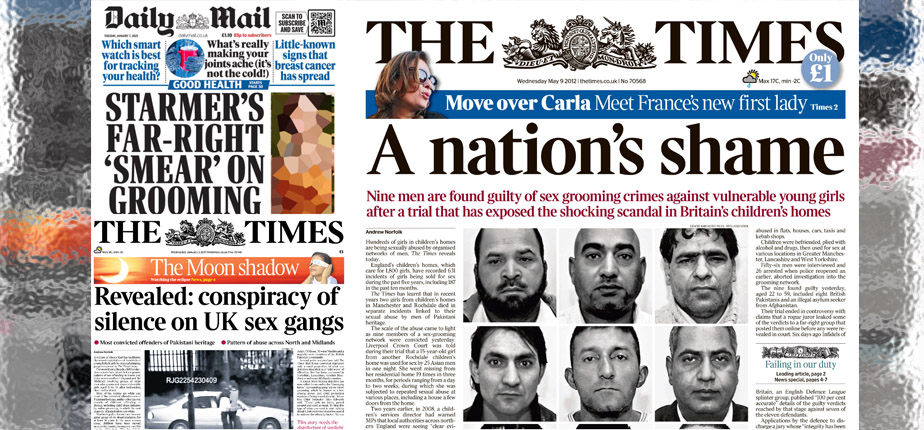
Dr Claudia Radiven
In early January 2025, Jess Phillips MP, Safeguarding and Violence Against Women and Girls Minister refused calls for (another) national inquiry into the Grooming Gangs after recent cases in Oldham, Greater Manchester. This resulted in a social media storm from individuals like Elon Musk, owner of X, formerly Twitter, who weighed in on a so-called ‘Islamic Crime’ problem. Musk went as far as to call Phillips a ‘rape genocide apologist’ and stated she deserved to be in prison, resulting in a wave of hate against the parliamentarian. Apart from the vitriol from individuals with questionable expertise, this latest outburst demonstrates once more the attempt to link a ‘race’ and crime.
Islamophobia as one of the most prevalent forms of racism, associates Muslimness with various features that pop up in public debate about immigration, crime, welfare, elections, global conflicts, or even marriage (arranged or consanguineous). Political commentators and media outlets rarely miss an opportunity to draw attention to the purported Muslim involvement in terrorism, drugs, or sexual violence and misogyny. Therefore, it is unsurprising that the return of the Grooming Gangs meme also involves recycling Islamophobic tropes.
The Grooming Gangs’ trope is a relatively new entrant into the vocabulary of racialised criminality. It is largely preserved for men assumed to be of Pakistani heritage who have been accused of sexual offences against minors. As is typical in such vocabularies, the perpetrator is ethnically marked, and the victim is white. For example, in the 19th century, so-called White Slavery, white women were supposed to be trafficked by men of Jewish background. In the 1970s, mugging was seen as a crime carried out by men of African-Caribbean heritage, and right-wingers proclaimed that 80 per cent of their victims were white. These moral panics portray their victims as exclusively white, despite evidence to the contrary.
The moral panic around ‘Pakistani groomers’ or ‘Asian grooming gangs’, when investigated, does not hold weight legally or statistically. Ella Cockbain and Waqas Tufail have written substantially on the ‘grooming gangs’ and have stated they are “better understood as a vaguely and inconsistently defined subset of child sexual exploitation offenders.” Further to this, they add, “Child Sexual Exploitation is itself a poorly delineated subset of child sexual abuse that spans diverse criminal offences (e.g., rape, sexual activity with a child)—most of which are also used in instances that would not normally be considered Child Sexual Exploitation.” (Cockbain & Tufail 2020:5).
In addressing this moral panic, a Home Office report from 2020 identified that group-based child sexual exploitation offenders are overwhelmingly white, with victims coming from a range of backgrounds and ethnicity, and including boys. The report acknowledged the inaccuracy of stating offenders were overwhelmingly Pakistani, but the public perception around this issue prevails. Whilst previously debunked reports claimed 84% of groomers were Asian, this statistic is still peddled out by those engaging in right-wing racist dog whistles. This persists among the public, mainstream media, and much of the political class despite a 2024 report which found 83% of perpetrators were white (conducted by the Hydrant Taskforce on Child Sexual Exploitation and the National Police Chief’s Council).
The political posturing calling for more inquiries and stronger police powers ignores the evidence to the contrary. Claims that the police are hindered by ‘political correctness’ or being too ‘woke’ are contradicted by numerous reports that the police have repeatedly targeted minorities prejudicially. The idea that political correctness in the country has prevented grooming from being addressed is nonsensical. The notion that what is needed is more packages and approaches to address these offences ignores the damaging cuts to public services, which have had a tremendous impact on the ability to combat various social issues, not just criminal ones.
The former home secretaries Braverman and Patel, along with many in the British Establishment and the media, viewed the Grooming Gang saga in terms of their culture wars. They push the line that the cause of the Grooming Gangs is something inherent in Pakistani men, derived from their religion or culture that makes them commit these offences. Braverman stated they are committed by those “who hold cultural attitudes completely incompatible with British values” (Owen 2023), enhancing the narrative that Pakistani/Islamic culture is incompatible with British values. This ‘conveniently’ echoes the rhetoric of counter-terror policies like Prevent. She further claims that it is an “open secret” within Asian communities. The latest comments from Badenoch, Musk, and others raised fears of a ‘Christchurch Mosque attack’ event in the UK, demonstrating the increasing risk to Muslims of mass violence as a consequence of this rhetoric.
The latest recycling of the grooming gang moral panic is unlikely to better protect the victims, but, as we have seen since the August 2024 riots, it is likely to invoke more violence and attacks on British Muslims. As a tool in the arsenal of Islamophobes, it has become nearly as potent as the narrative that terrorism is solely a Muslim issue. As we know from policy and practice, this has terrible consequences.
Dr Claudia Radiven,
Lecturer in Sociology and Social Policy, University of Leeds